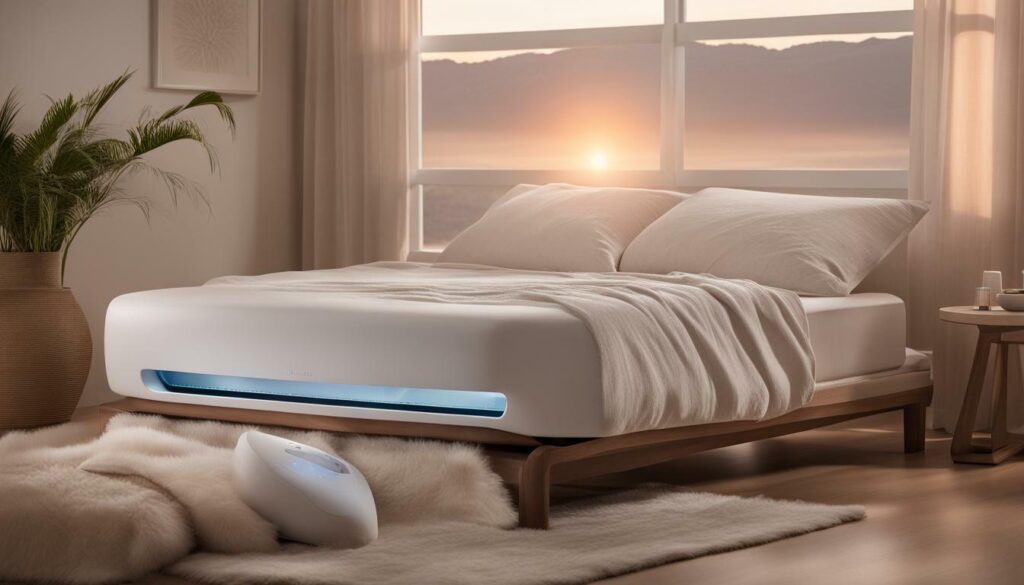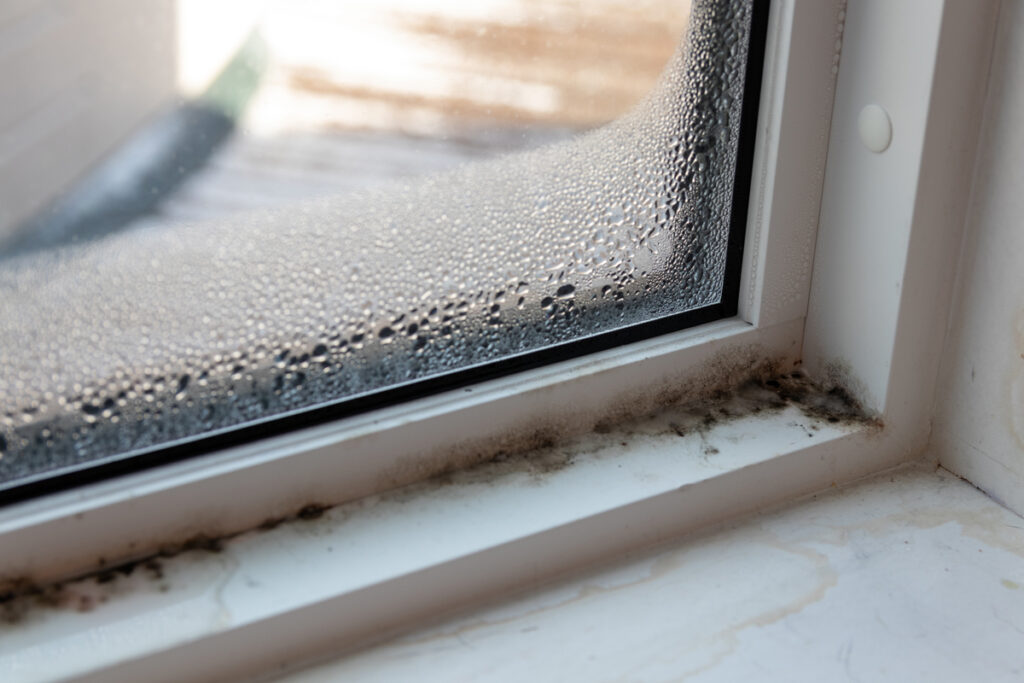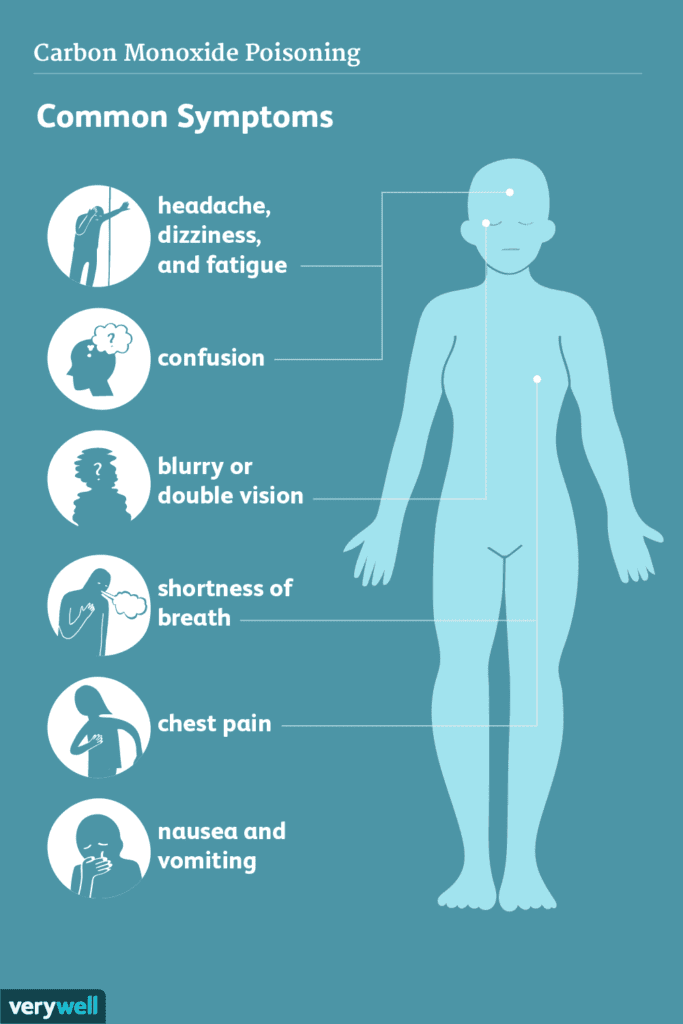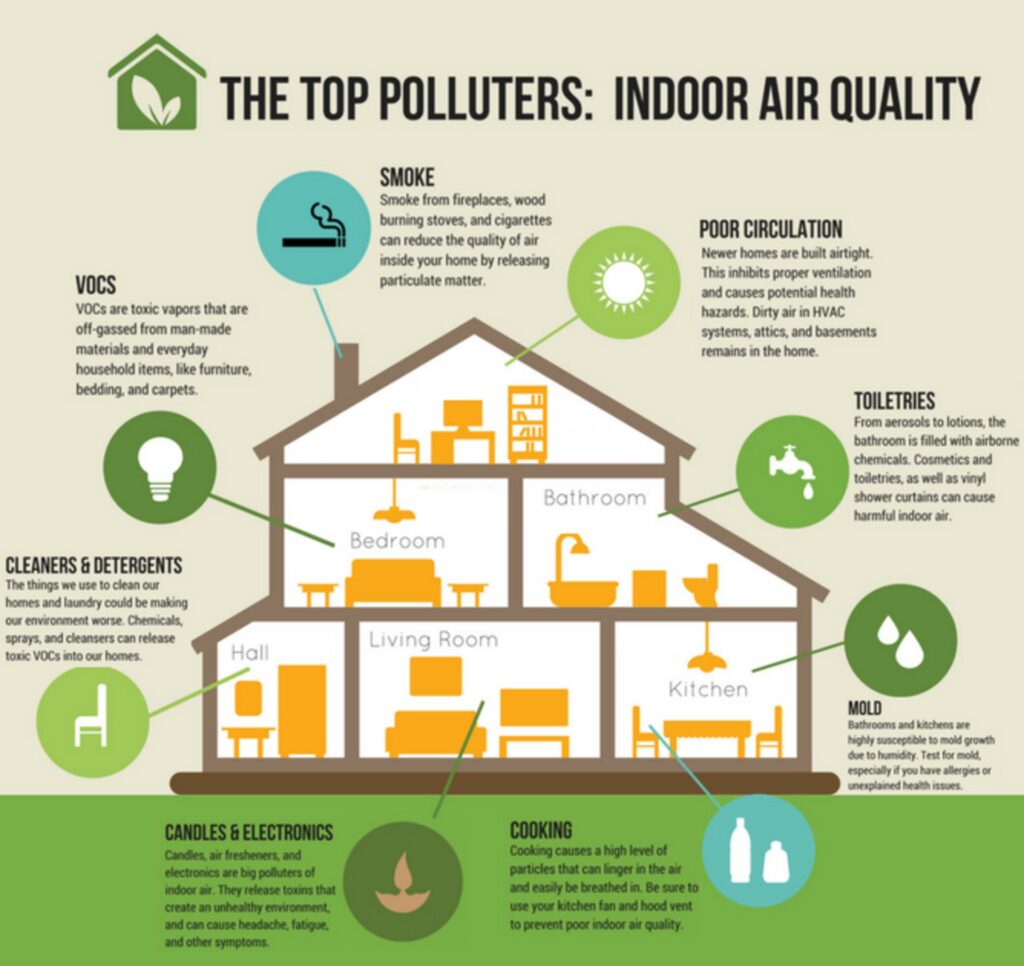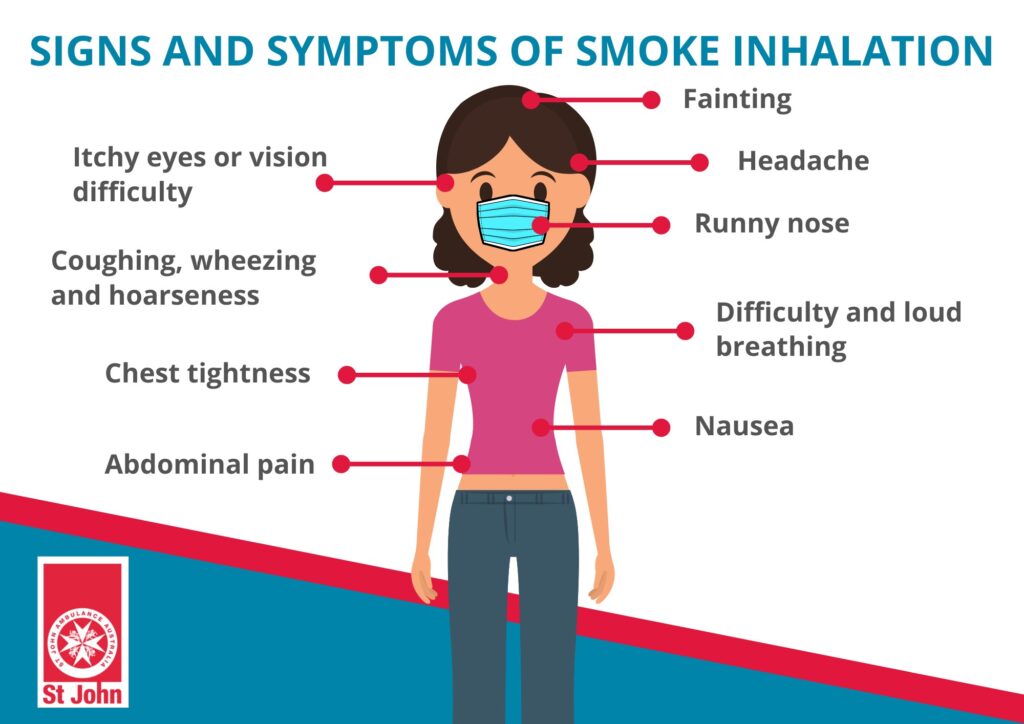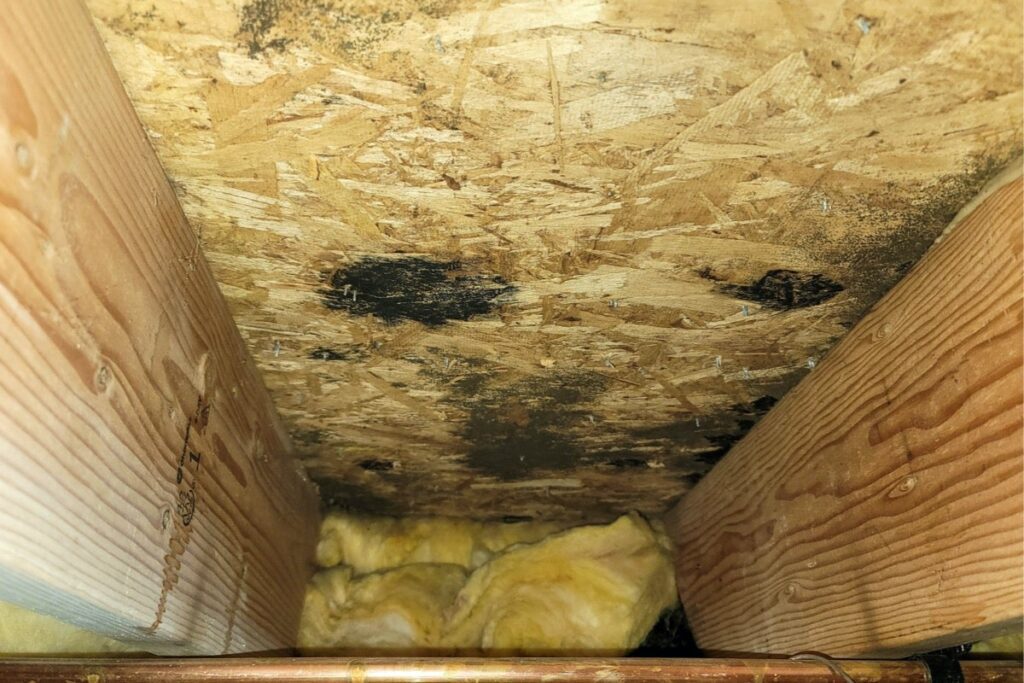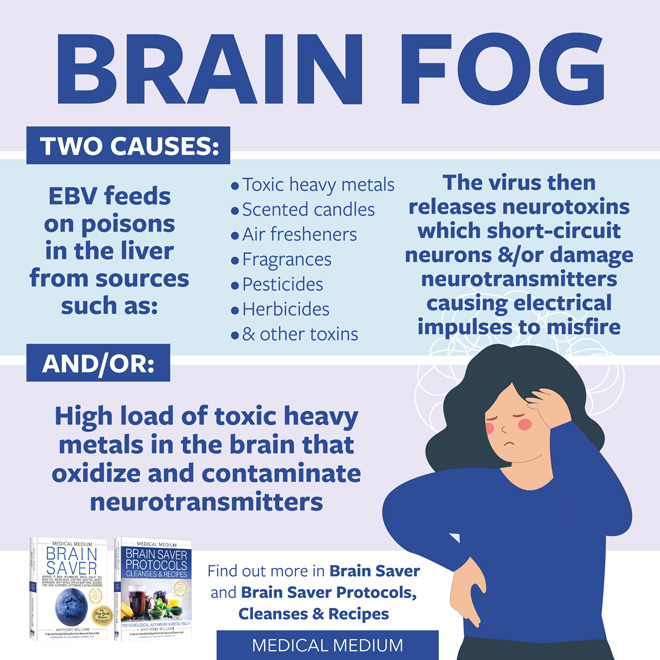If you’re someone who struggles to breathe easy at night or has allergies, you may have considered using an air purifier in your bedroom. But is it actually healthy to sleep with an air purifier on? In this section, we’ll explore the potential benefits and concerns associated with sleeping with an air purifier so you can make an informed decision.
While air purifiers can offer numerous benefits, there are potential drawbacks to consider as well. Let’s take a closer look.
Key Takeaways:
- Sleeping with an air purifier can potentially have a positive impact on your health by reducing allergens and improving air quality.
- It’s important to choose the right air purifier for your specific needs and maintain it properly.
- Be aware of any potential concerns or drawbacks associated with using an air purifier while you sleep.
Understanding Air Purifiers and Their Functions
If you’re looking to improve your sleep quality, you may have heard about the benefits of using an air purifier. But what exactly is an air purifier, and how can it help you sleep better?
Simply put, an air purifier is a device that cleans the air in your home or bedroom. It works by removing impurities such as dust, pollen, pet dander, and other allergens from the air, leaving you with cleaner, fresher air to breathe.
But the benefits of an air purifier go beyond just cleaner air. By reducing the amount of allergens and other irritants in the air, an air purifier can also help improve the quality of your sleep.
For example, if you suffer from allergies or asthma, you may find that using an air purifier can help reduce your symptoms and allow you to breathe more easily while you sleep. And even if you don’t have any specific respiratory issues, you may notice that you wake up feeling more refreshed and energized when you sleep in an environment with cleaner air.
So if you’re looking to improve your sleep quality, investing in an air purifier may be worth considering. Not only can it help you breathe easier and more comfortably, but it can also contribute to a more restful night’s sleep.
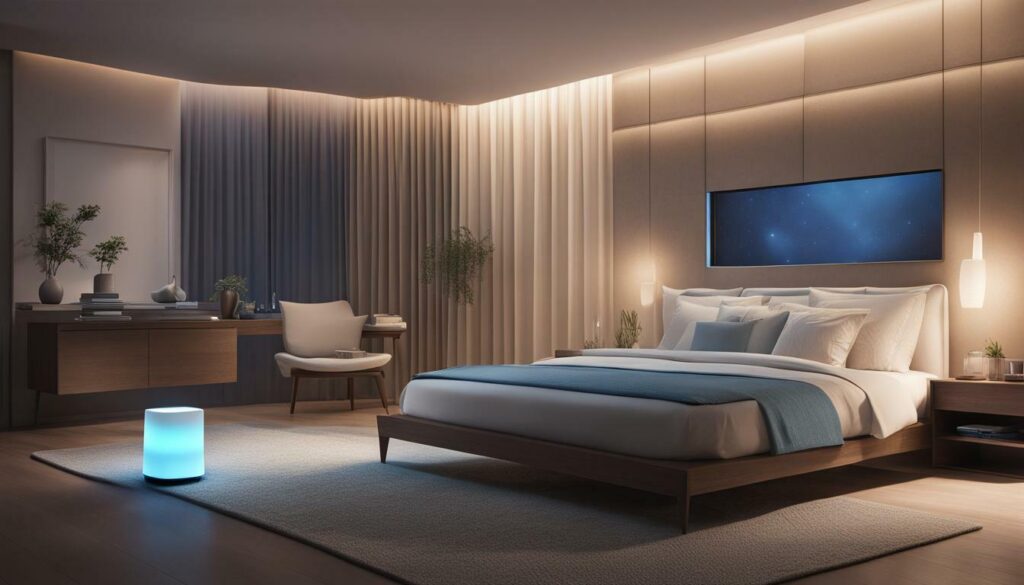

Benefits of Sleeping with an Air Purifier
Using an air purifier while sleeping can provide numerous advantages, contributing to a healthier sleep environment and improving overall sleep quality. Here are some of the top benefits that come with incorporating an air purifier into your bedtime routine:
- Reduction of allergens: Air purifiers can effectively remove common allergens such as dust, pollen, and pet dander from the air, making it easier for you to breathe and reducing the risk of allergic reactions.
- Prevention of respiratory illnesses: By removing airborne pollutants and irritants, air purifiers can help prevent respiratory illnesses such as asthma and bronchitis, particularly in individuals with pre-existing respiratory conditions.
- Improved air quality: Air purifiers can remove harmful pollutants and toxins from the air, creating a cleaner and healthier sleep environment. This can be particularly beneficial for individuals living in areas with high levels of pollution.
- Enhanced relaxation: Air purifiers can help create a more relaxing atmosphere, making it easier to fall asleep and stay asleep throughout the night.
- Reduced snoring: Air purifiers can help reduce snoring by removing irritants from the air that can lead to nasal congestion and other breathing issues.
By using an air purifier while sleeping, you can experience these benefits and improve your overall sleep health. However, it’s important to choose the right air purifier for your specific needs and ensure proper maintenance to ensure optimal performance.
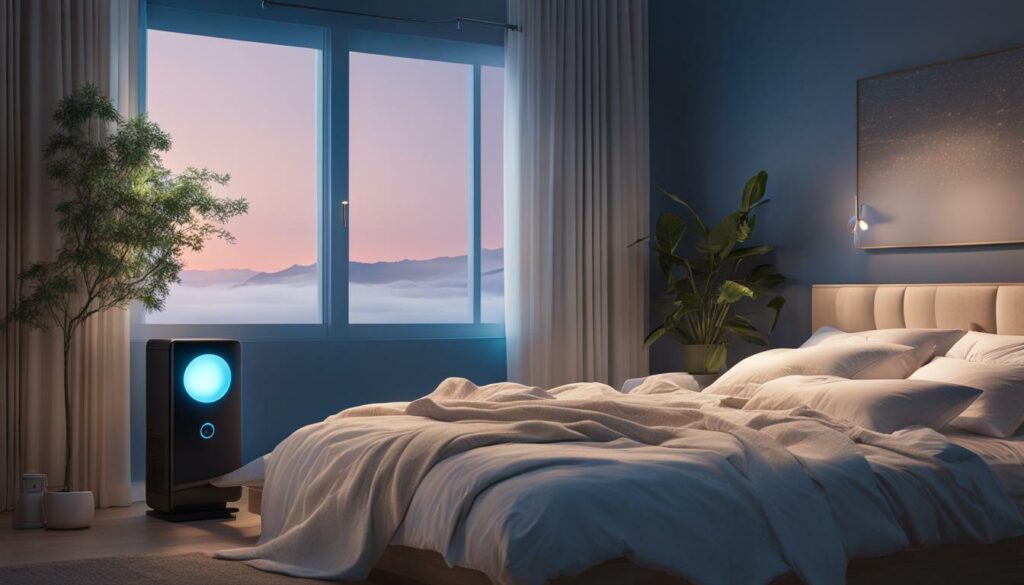

How Air Purifiers Enhance Sleep Quality
If you struggle with getting a good night’s sleep, an air purifier could help. Not only can it remove harmful pollutants from the air, but it can also create a more relaxing atmosphere, leading to better sleep quality.
Air purifiers work by filtering out tiny particles, such as dust, smoke, and allergens, that can aggravate your respiratory system and disrupt your sleep. By removing these irritants from the air, you can breathe easier and sleep more soundly.
In addition to filtering out pollutants, some air purifiers also emit white noise, which can help drown out other disruptive sounds. The consistent hum of the air purifier can create a soothing and calming environment, leading to better sleep.
Overall, the use of an air purifier can contribute to a healthier sleep environment, reducing the risk of respiratory illness and promoting better sleep quality. If you struggle with allergies or other respiratory issues, an air purifier may be particularly beneficial.
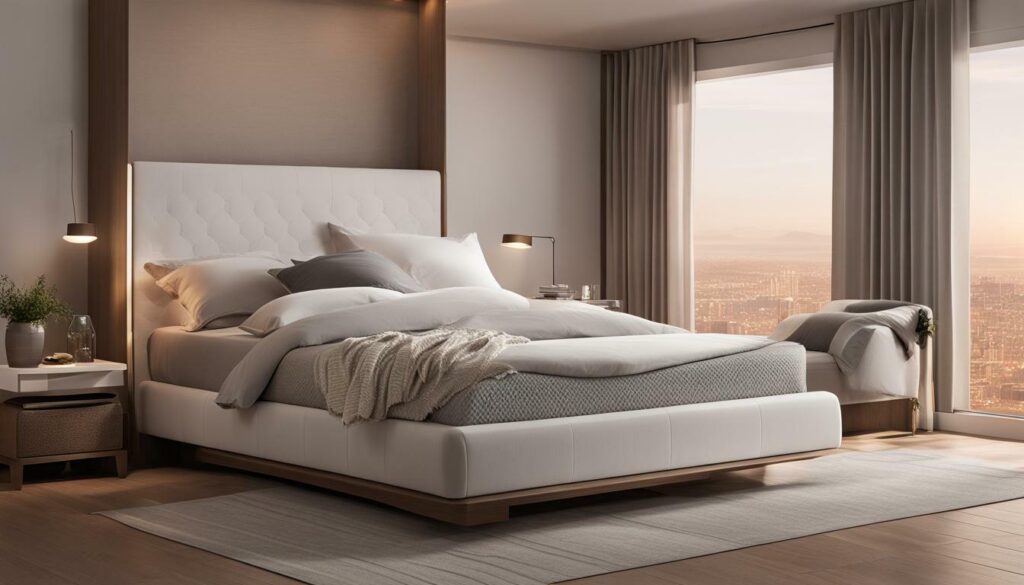

However, it’s important to note that air purifiers are not a magic solution for sleep problems. While they can help, they should be used in conjunction with other strategies for improving sleep quality, such as maintaining a consistent sleep schedule, creating a comfortable sleep environment, and limiting screen time before bed.
Ultimately, incorporating an air purifier into your sleep routine is a personal choice that depends on your specific needs and preferences. Consult with a healthcare professional or sleep expert if you have concerns about using an air purifier while you sleep.
Potential Concerns of Sleeping with an Air Purifier
While air purifiers offer numerous benefits, you may have concerns about their safety and effectiveness when used while sleeping. First, some air purifiers emit ozone, which can cause respiratory irritation and other health problems. However, many modern air purifiers are designed to emit minimal levels of ozone or no ozone at all.
Another concern is the noise level of the air purifier. Some models can produce a loud humming or buzzing noise, which can be disruptive to your sleep. However, many air purifiers are designed to operate silently, making them ideal for bedroom use.
You may also be worried about the cost of using an air purifier. While some models can be expensive, there are affordable options available that still provide effective air purification. Additionally, the benefits of using an air purifier may outweigh the initial cost.
Finally, you may be concerned about the maintenance and cleaning required for your air purifier to function properly. Regular cleaning and filter replacements are necessary to ensure optimal performance and longevity of your air purifier. However, this maintenance is relatively simple and can be done quickly and easily.
Ultimately, whether or not you should use an air purifier while sleeping depends on your individual needs and concerns. If you’re considering using an air purifier, be sure to do your research and choose a model that meets your specific needs and preferences.
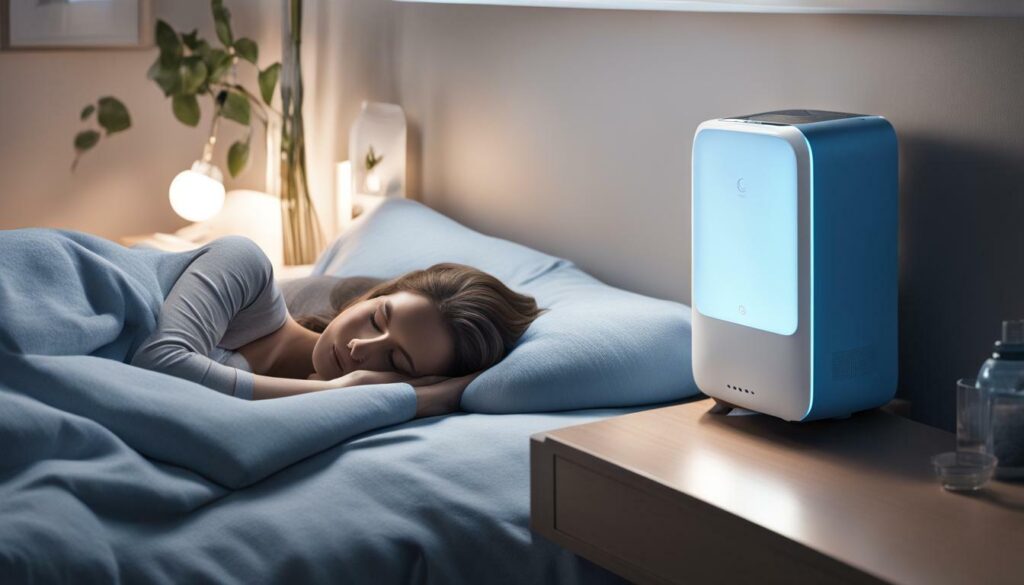

Choosing the Right Air Purifier for Your Sleep Environment
Not all air purifiers are created equal, and choosing the right one for your sleep environment is crucial. Here are some tips to help you select an air purifier that suits your specific needs:
- Consider the size of your room: Choose an air purifier with a coverage area that matches or exceeds the size of your bedroom. A larger unit may be necessary for larger rooms.
- Look for a HEPA filter: A HEPA (High-Efficiency Particulate Air) filter can capture a majority of airborne particles, including pollen, dust, and pet dander, that could disrupt your sleep. Make sure the purifier you choose has a HEPA filter.
- Consider noise level: Some air purifiers can be noisy, which could interfere with your sleep. Look for a purifier with a noise level of 50 decibels or less.
- Check the CADR rating: CADR (Clean Air Delivery Rate) measures the purifier’s effectiveness in removing pollutants from the air. Look for a purifier with a CADR rating that is appropriate for the size of your room.
- Look for additional features: Some air purifiers come with additional features such as air quality sensors, programmable timers, and automatic shut-off. Consider which features could benefit you.
By keeping these tips in mind, you can choose an air purifier that fits your specific needs and contributes to a healthier sleep environment.
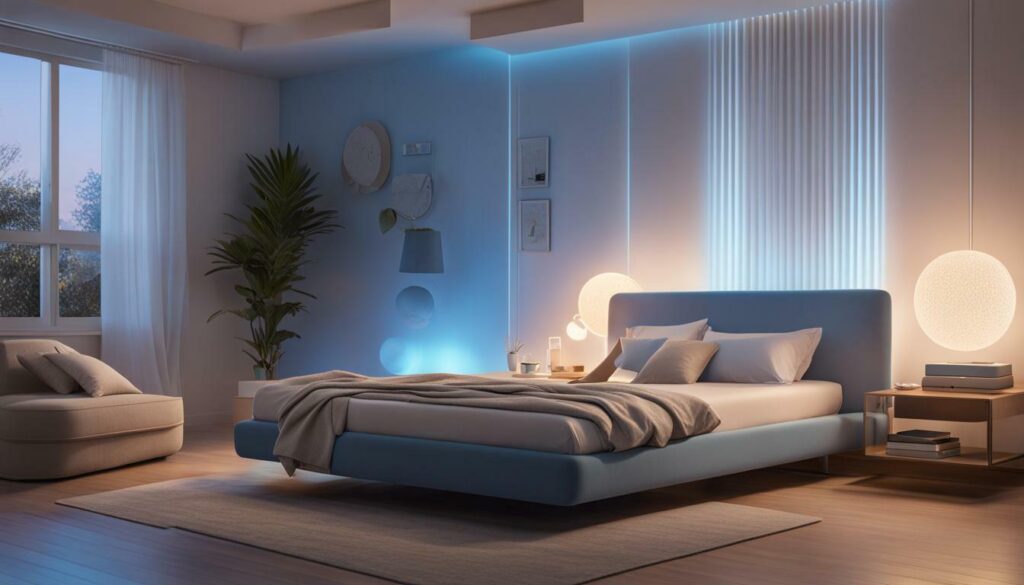

Other Strategies for Improving Sleep Quality
Using an air purifier while you sleep can definitely improve the quality of your sleep environment, but it’s not the only solution. There are other strategies and lifestyle changes you can make to promote better sleep.
- Adjust your sleep schedule: Try to stick to a consistent sleep schedule, even on weekends. This can help regulate your body’s internal clock and make it easier to fall and stay asleep.
- Create a relaxing bedtime routine: Develop a bedtime routine that is calming and consistent. This can include activities such as taking a warm bath, reading a book, or practicing relaxation techniques.
- Make your bedroom a comfortable sleep environment: Keep your bedroom quiet, cool, and dark. Use comfortable bedding and pillows, and remove any distractions that could interfere with your sleep.
- Avoid stimulants before bed: Avoid caffeine, nicotine, and alcohol before bed, as these can interfere with your sleep.
By incorporating these strategies along with using an air purifier, you can create a holistic approach to improving your sleep quality. Sweet dreams!
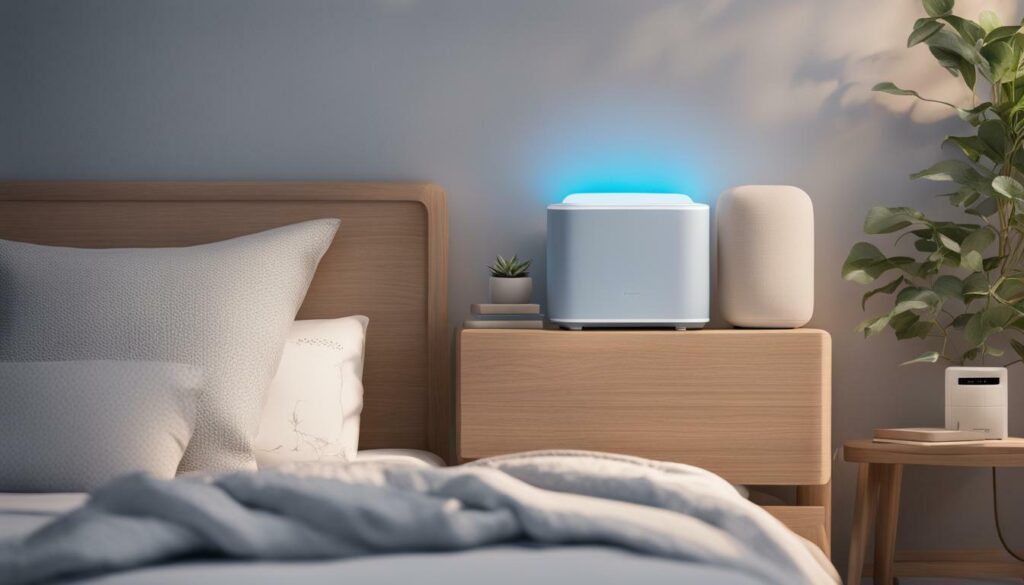

Maintaining and Cleaning Your Air Purifier
If you’ve decided to use an air purifier while sleeping to improve your sleep quality, it’s essential to maintain and clean it regularly. Neglecting this task can cause a buildup of dust and particles in the machine, leading to reduced effectiveness and even potential health hazards. Follow these expert tips to keep your air purifier running smoothly:
- Refer to the manufacturer’s instructions: Every air purifier is different, and the manufacturer’s instructions will provide specific guidance on how to clean and maintain your model. Be sure to read these instructions carefully and follow them closely.
- Replace filters regularly: The filter is the most critical component of an air purifier, and it’s essential to replace it according to the manufacturer’s recommendations. Most filters need to be replaced every 6-12 months, but this can vary depending on usage and the level of pollutants in the air. Keep an eye on the filter’s condition and replace it promptly when it shows signs of wear and tear.
- Clean the exterior regularly: Dust and debris can accumulate on the exterior of your air purifier, reducing its overall effectiveness. Wipe down the exterior of the machine with a damp cloth or vacuum it regularly to remove any dust or debris.
- Keep the air purifier away from other appliances: Air purifiers should be placed away from other household appliances, including TVs, computers, and heaters. These appliances can produce electromagnetic fields that can interfere with the air purifier’s performance.
By taking these steps, you can ensure that your air purifier continues to function effectively, providing you with cleaner air and better sleep quality.
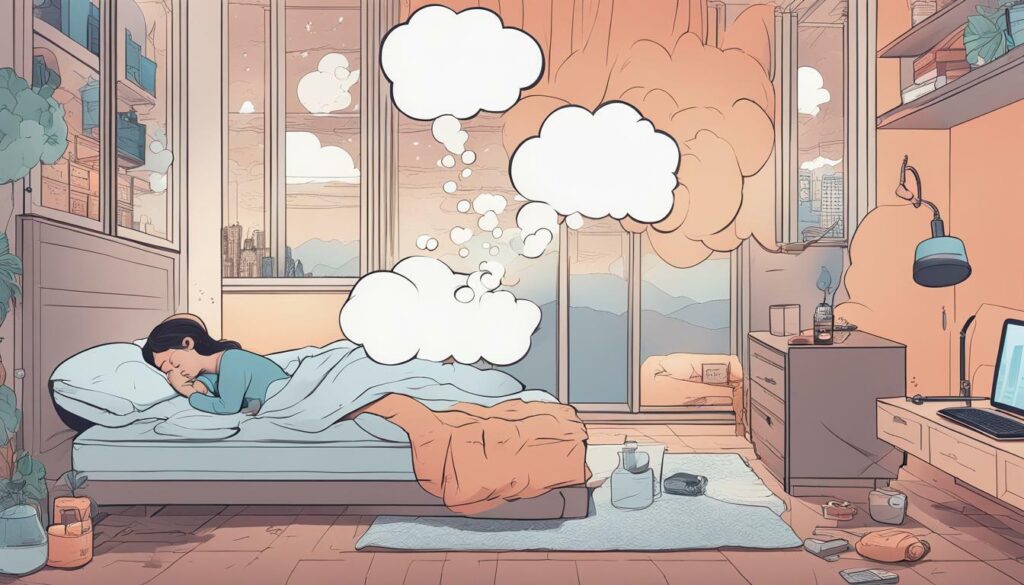

Expert Recommendations on Sleeping with an Air Purifier
When it comes to improving your sleep environment, incorporating an air purifier may be a step in the right direction. According to sleep experts, air purifiers can potentially reduce allergens, pollutants, and other airborne irritants, leading to a cleaner and healthier sleep environment. This can ultimately contribute to better sleep quality and overall health.
Experts recommend choosing an air purifier with a HEPA filter, which can capture particles as small as 0.3 microns in size, including pollen, dust mites, and pet dander. Additionally, it’s important to select an air purifier with an appropriate room size rating to ensure optimal performance.
While some may worry about the potential noise level of an air purifier disrupting their sleep, experts suggest selecting a model with a low decibel level or a “sleep mode” option to minimize disturbance. Additionally, maintaining and cleaning your air purifier regularly can help avoid any potential odors or buildup that may affect air quality and performance.
Overall, incorporating an air purifier into your sleep routine may be a worthwhile investment for improving your sleep quality and overall health. Consult with a sleep specialist or healthcare provider to determine if an air purifier is a good fit for your specific needs and sleep environment.
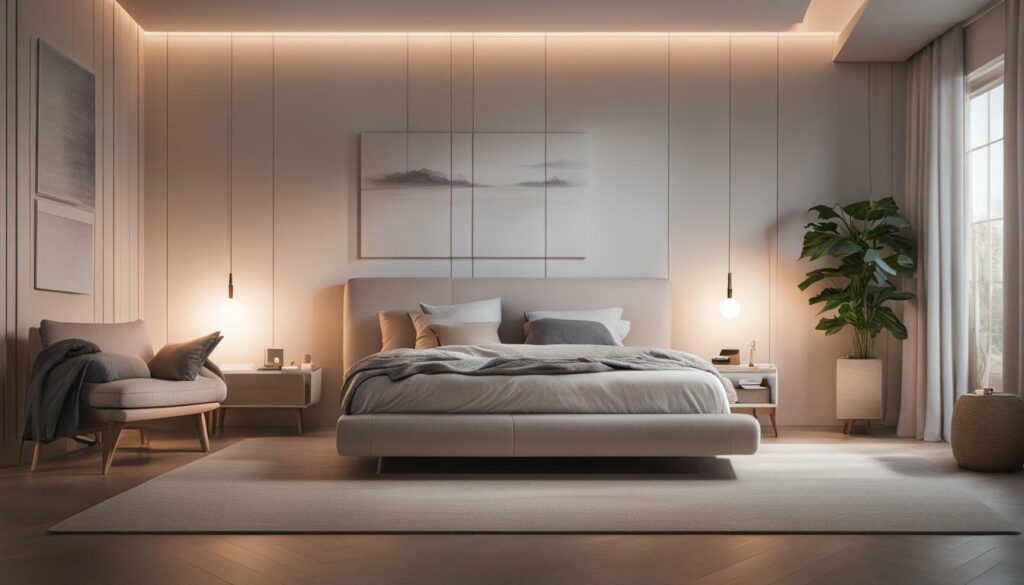

Real User Experiences and Testimonials
Curious about the benefits of sleeping with an air purifier? Don’t just take our word for it – here are some real user experiences and testimonials:
“I used to wake up with a stuffy nose and itchy eyes every morning. Since I started using an air purifier in my bedroom, those symptoms have disappeared. I wake up feeling refreshed and ready to start the day!”
“My partner used to snore loudly, which made it hard for me to fall asleep. After we got an air purifier, the air quality improved and their snoring reduced significantly. We both sleep better now!”
These are just a few examples of the benefits that individuals have experienced from sleeping with an air purifier. By removing harmful pollutants and allergens from the air, air purifiers can create a cleaner, healthier sleep environment.
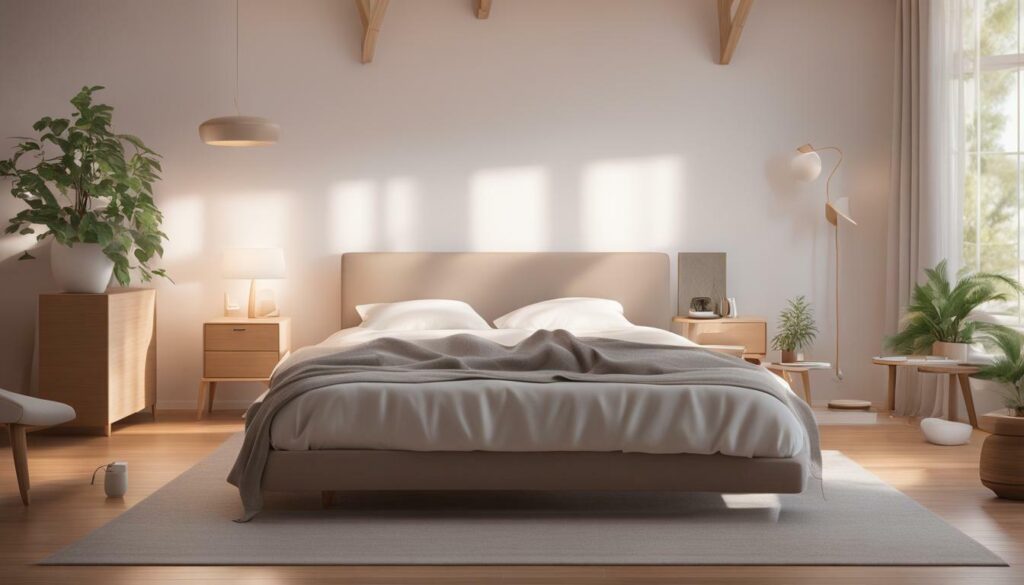

By choosing the right air purifier for your specific needs and maintaining it properly, you too can experience the benefits of sleeping with an air purifier.
Conclusion
After weighing the potential benefits and concerns of sleeping with an air purifier, it’s clear that incorporating one into your sleep routine can make a significant difference in creating a healthier sleep environment. Not only can air purifiers reduce allergens and improve air quality, but they can also contribute to a more relaxing atmosphere and enhance overall sleep quality.
However, it’s important to choose an air purifier that is suitable for your specific needs, maintain it properly, and consider other strategies for improving sleep quality, such as creating a comfortable sleep environment and adopting healthy sleep habits.
Your decision to use an air purifier while you sleep should be based on your personal preference, needs, and circumstances. If you’re considering using an air purifier, consult with a sleep expert or healthcare professional to determine if it’s the right choice for you.
By taking steps to create a healthier sleep environment, you can set yourself up for a more restful and rejuvenating night’s sleep. So go ahead, add an air purifier to your sleep routine, and enjoy the benefits of a cleaner, clearer, and more relaxing sleep experience.
FAQ
Q: Is it healthy to sleep with an air purifier?
A: Yes, sleeping with an air purifier can be beneficial for your health. It helps to remove airborne pollutants and allergens, improving the air quality in your sleep environment.
Q: What are the benefits of sleeping with an air purifier?
A: There are several benefits to sleeping with an air purifier. It can reduce allergens, improve air quality, create a more relaxing atmosphere, and enhance overall sleep quality.
Q: How do air purifiers enhance sleep quality?
A: Air purifiers can enhance sleep quality by removing airborne pollutants, creating a cleaner and healthier sleep environment. They also help to create a more relaxing atmosphere, promoting a restful night’s sleep.
Q: Are there any potential concerns with sleeping with an air purifier?
A: While air purifiers offer numerous benefits, there are some potential concerns to be aware of. These include noise levels, maintenance and cleaning requirements, and the need to choose the right air purifier for your specific needs.
Q: How do I choose the right air purifier for my sleep environment?
A: When selecting an air purifier for your sleep environment, consider factors such as room size, filtration system, noise levels, and any specific concerns or needs you may have. It’s important to choose a purifier that suits your requirements and preferences.
Q: Are there other strategies for improving sleep quality?
A: Yes, in addition to using an air purifier, there are other strategies that can help improve sleep quality. These include maintaining a consistent sleep schedule, creating a relaxing bedtime routine, optimizing your sleep environment, and practicing good sleep hygiene.
Q: How should I maintain and clean my air purifier?
A: To maintain optimal performance of your air purifier, regular cleaning is necessary. Follow the manufacturer’s instructions for cleaning and replacing filters. Additionally, keep the surrounding area clean to prevent dust buildup on the purifier.
Q: What do sleep experts recommend regarding sleeping with an air purifier?
A: Sleep experts generally recommend using an air purifier while sleeping, especially for individuals with allergies or respiratory conditions. They emphasize the importance of choosing the right purifier and maintaining it properly for maximum benefits.
Q: Are there any real user experiences and testimonials about sleeping with an air purifier?
A: Yes, many individuals have shared their positive experiences of incorporating an air purifier into their sleep routine. Users have reported improved sleep quality, reduced allergy symptoms, and a cleaner sleep environment.

